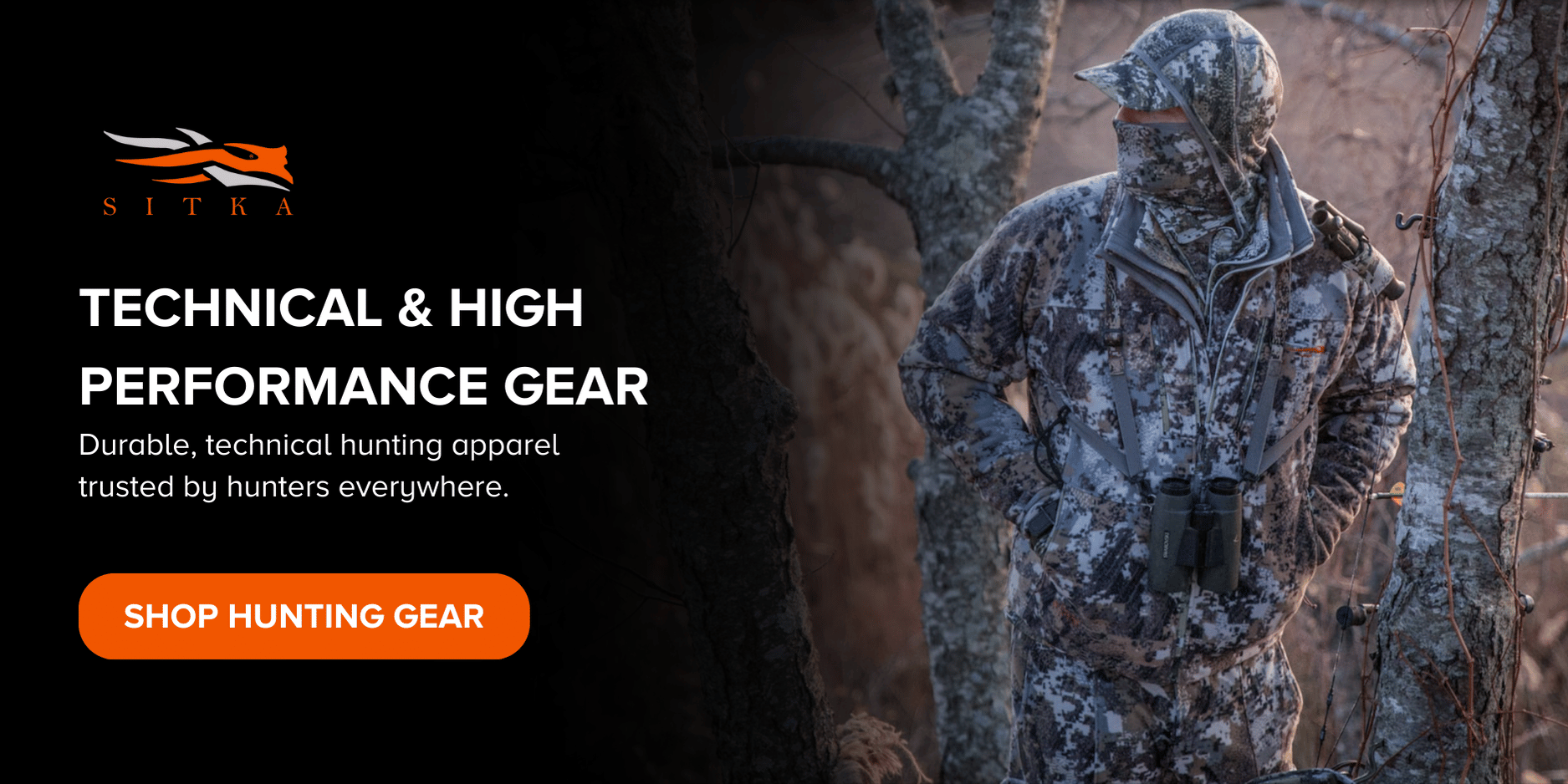Joe Fields | 7.29.2025
How to Start Hunting as an Adult
How to Start Hunting as an Adult: A Helpful Guide
You’re not alone in wanting to become a hunter: Hunting has seen a 26% surge since 2016. In addition to scoring game, hunting can foster a deep connection to wildlife and a hard-earned sense of personal achievement.
Like any hobby, hunting takes practice to master—which means new hunters need to do their homework before venturing outdoors. Keep reading to learn how to start hunting and set yourself up for success with SITKA Gear.
Understanding Why You Want to Hunt
Before you set out on your first hunting trip, consider the full range of benefits this outdoor tradition has to offer.
Personal Fulfillment
Hunting is an exercise in self-reliance and resourcefulness. Knowing you can provide sustenance for yourself and your family is an honorable goal that breeds personal satisfaction. Plus, hunting is hard—which makes success even sweeter.
Connection to Nature
One of the biggest misconceptions about hunters is that they don’t care about the environment. The opposite is true: Hunters are responsible for funding many of the United States’ conservation efforts. In the words of Teddy Roosevelt, “In a civilized and cultivated country, wild animals only continue to exist at all when preserved by sportsmen.”
Fresh Meat
With hunting, as with many things, the journey is the destination. Scoring 30 pounds of fresh meat is a pretty epic prize—healthier and more sustainable than anything you can find at the grocery store.
Deciding What to Hunt
The next step is selecting your desired targets. Most hunters recommend that newbies start with small game hunting —squirrels, rabbits, and birds—and use a shotgun. If you want to jump right into big-game hunting—deer, moose, elk, caribou, or bison—you’ll need a rifle (and a willingness to spend more time and money in pursuit of your prey).
Essential Hunting Skills to Develop
To begin hunting, there are some skills you must learn and many others you should learn. Let’s start with the basics.
Learning Animal Behavior
You need to know where your prey lives, what it eats, and how it sounds to track and hunt it. Learning how to identify the tracks, droppings, and activity patterns of the game animal you’re after will skyrocket your odds of success.
Navigating the Outdoors
You can’t always rely on your GPS to navigate while hunting. Make sure you scout your location thoroughly in advance and come with a downloaded or printed map. To find a list of public land available for hunting, check out the website for your state’s wildlife agency.
Handling Your Weapons
In addition to the basic hunting safety course, you’ll want to train with your weapon as much as possible before your first hunt. “I try to shoot my bow every day for two months prior to opening day—this usually means an hour at the archery range or at least a half-hour in front of the backyard target,” says seasoned bow and rifle hunter Ian Fohrman. If you’re hunting with a rifle, Fohrman recommends a handful of days at the range at the very least before taking your skills outdoors.
Gearing Up for Hunting
Equipping yourself with the right hunting gear will ensure both personal safety and comfort while pursuing your game.
Clothing Essentials
In general, cheap hunting clothes indicate cheap quality. Better to spend a bit extra for performance hunting gear that’s durable and guaranteed to keep you warm and dry. You’ll want a moisture-wicking base, an insulating layer, and an outer shell that’s both wind- and water-resistant. Make sure your top layer is quiet, too; if your hunting jacket rustles when you move, it can scare your prey away.
The color of your outer shell will depend on what you’re hunting. Camo is recommended for wild turkey and duck on account of their excellent vision. Hunter orange will keep you visible to other hunters but hidden from deer and other big game. These animals have dichromatic vision, meaning your blaze orange hunting gear will appear to them as a dull gray.
For footwear, you’ll want a sturdy pair of hunting boots and wool socks.
Key Hunting Tools and Equipment
Hope for the best and prepare for the worst when you’re headed into the field. Always pack for a sudden change in weather, and make sure you have a map of the land where you’re hunting. Bring your preferred hunting weapon and additional ammunition. If you plan on field dressing your hunted game—removing the internal organs—you’ll need a hunting knife, rope, and latex gloves in your hunting pack.
This is all in addition to your basic outdoor essentials, including:
First aid kit
Compass
Map
Matches/tinder
Headlight/flashlight
Water/snacks
Finding the Right Community
“Be aware that hunting knowledge is often hard-won and kept close to the chest,” says Fohrman. By all means, do your research—the internet is full of helpful guides and tutorials—but to elevate your expertise, you’ll want to ingratiate yourself into a community of hunters who can show you the ropes firsthand.
Hunting Clubs
You might already have a hunter in your life willing to take you under his or her wing, but if not, consider joining a local organization. Conservation groups are a solid place to start. Additionally, consider visiting your local gun range or shop to see if they have any hunting clubs of their own.
Finding a Mentor
A hunting mentor is an invaluable asset as you find your footing as a new hunter. And while you can’t force somebody to mentor you, showing diligence in your weapon training will increase the likelihood you’re invited to tag along with more experienced hunters.
Navigating Hunting Regulations and Licensing
Licenses, permits, and tags—oh, my! Hunting regulations are notoriously complex and everchanging. When planning your first hunting trip, the first thing you should do is review your state’s laws and regulations, which should be available online.
Hunting Education Courses
A hunting safety class is mandatory in almost every state. It lasts for a day or two and covers basic gun safety, hunting regulations, and etiquette.
Hunting License
A hunting license is required to hunt legally in the United States. They can be purchased from most sporting goods stores or online via your local state wildlife agency. Keep in mind that you need a hunting license from the state where you’re planning to hunt. So if you live in New York but wish to hunt in Maine, you’ll need a Maine hunting license.
Hunting Tags
In addition to a license, certain game—usually big game—require the purchase of a tag for the specific animal you wish to hunt. Each state has its own unique requirements and deadlines, so it’s important to read up on your state’s regulations.
Check out our big game hunting gear if this is the size of game you’re after.
Ethical Hunting Practices and Conservation
Hunters, with their deep knowledge of and respect for wildlife, are among the country’s most ardent conservationists. Environmentalists and animal rights activists even turn to hunting as an alternative to the inhumane and unsustainable practices in American farming. Some basic principles of ethical hunting include:
Fair chase – Giving the animal a fair chance to escape capture or death, to ensure the hunter doesn’t have an unfair advantage.
Selective hunting – Targeting a specific animal—such as an older or weaker one over one who can breed—to protect the health of the species.
Leave no trace – Disposing of all waste, following all regulations, and avoiding disturbance of all other animals.
Preparing for Your First Hunt
Now that you know the basics, you’re ready to embark on your first hunt. Remember: Hunting has a steep learning curve, and successfully hunting big game can take an especially long time. Make sure to practice consistently, and don’t be discouraged if you return from your first hunt empty-handed.
Scouting Locations
Once you’ve decided where you’re going to hunt, you’ll need to scout the land ahead of time. Look for two things during your scouting:
Evidence that the game you’re hunting is on the property.
A good place for you to set up.
Once you choose your precise location, take note of its coordinates and the route you took to get there.
Practicing Safety
Safety comes first, whether you’re at the shooting range or in the field. If you don't think you can take a safe or ethical shot, then don’t. You can always take another shot, but you can never take a shot back.
Set Yourself Up for Success with SITKA
When you’re out in the field, your attention should be zeroed in on your surroundings, your game, and your shot—not your gear. Investing in high-quality, well-fitted hunting gear will ensure your comfort, safety, and success while doing what you love most.
At SITKA, we construct our hunting apparel with science-backed, field-proven technology that fits the needs of any pursuit. We’re here to provide functional solutions for any terrain, climate, or pursuit. For a skill that lasts you a lifetime, your gear should, too.
Sources
U.S. Fish and Wildlife Service. Hunters as Conservationists.
Outside. The Beginner’s Guide to Hunting.
U.S. Department of Agriculture Animal & Plant Health Inspection Service. Wild Turkeys.
Rocky Mountain Elk Foundation. What You See, Isn’t What That Elk Sees – Eye of the Beholder.
Texas Parks and Wildlife. Hunter Education Requirements by State/Territory.
U. S. Fish and Wildlife Services. Purchase a Hunting License.
Real Vail. Ethics and Principles in Hunting: Preserving Tradition, Respecting Nature.


